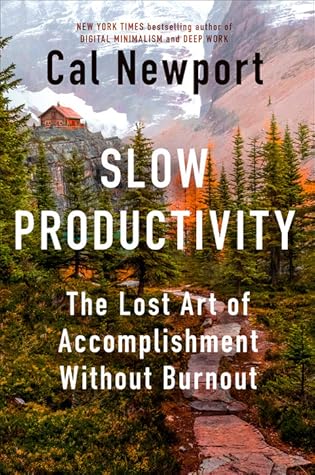More on this book
Community
Kindle Notes & Highlights
by
Cal Newport
Read between
May 16 - June 10, 2024
SLOW PRODUCTIVITY A philosophy for organizing knowledge work efforts in a sustainable and meaningful manner, based on the following three principles: 1. Do fewer things. 2. Work at a natural pace. 3. Obsess over quality.
PRINCIPLE #1: DO FEWER THINGS Strive to reduce your obligations to the point where you can easily imagine accomplishing them with time to spare. Leverage this reduced load to more fully embrace and advance the small number of projects that matter most.
The advantage of doing fewer things, however, is about more than just increasing the raw number of hours dedicated to useful activity; the quality of these hours also increases. When you approach a project without the hurried need to tend many barely contained fires, you enjoy a more expansive sense of experimentation and possibility.
our brains work better when we’re not rushing.
it’s not the actual execution of a small commitment that generates distraction, it’s instead the cognitive effort required to remember it, to worry about it, and to eventually find time for it in your schedule. If you can minimize this preparatory effort, you can contain the impact of the task itself.
Working on fewer things can paradoxically produce more value in the long term: overload generates an untenable quantity of nonproductive overhead.
Galileo’s professional life was more leisurely and less intense than that of the average twenty-first-century knowledge worker. Yet he still managed to change the course of human intellectual history.
PRINCIPLE #2: WORK AT A NATURAL PACE Don’t rush your most important work. Allow it instead to unfold along a sustainable timeline, with variations in intensity, in settings conducive to brilliance.
“Deciding what not to do is as important as deciding what to do,”
If you announce your work in advance to people you know, you’ll have created expectations. If you fail to produce something notable, you’ll pay a social cost in terms of embarrassment. Not surprisingly, this, too, can act as a powerful motivator.
This is what ultimately matters: where you end up, not the speed at which you get there, or the number of people you impress with your jittery busyness along the way.


